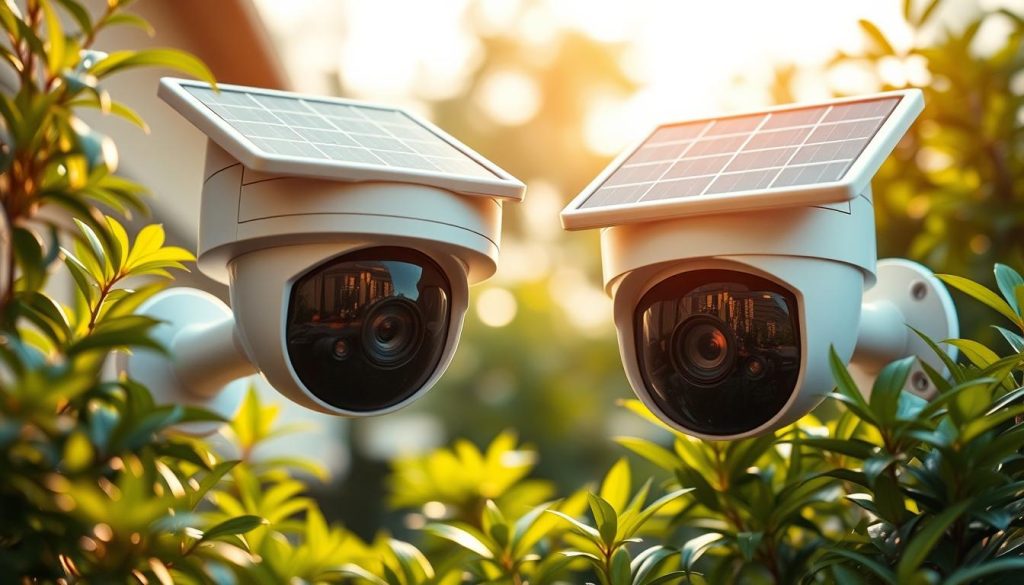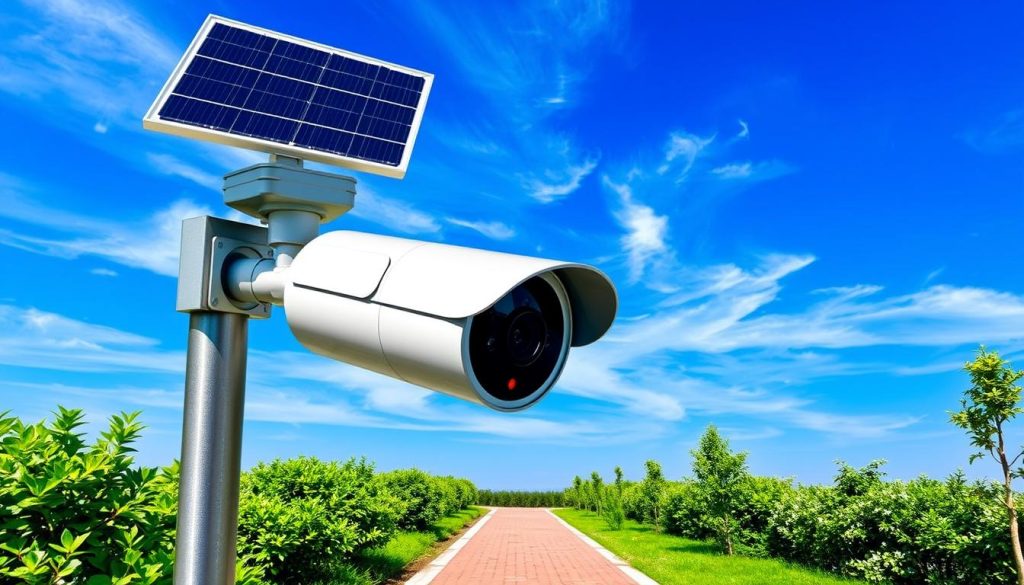Singapore is rapidly adopting advanced security solutions to enhance safety in both urban and rural areas. One standout innovation is the use of solar-powered camera systems, which offer energy independence and seamless connectivity. These setups eliminate the need for complex wiring, making them ideal for remote locations like construction sites and farms.
Leading brands like Hikvision provide models with extended battery life, ensuring uninterrupted monitoring even during power outages. The TP-Link VIGI SP9030, for instance, delivers crisp 4MP color night vision—perfect for Singapore’s tropical climate. With a 30% annual growth in adoption, these systems are proving to be a cost-effective alternative to traditional wired setups.
Key Takeaways
- Solar-powered cameras ensure energy-efficient, wire-free security.
- Ideal for remote areas like farms and construction sites.
- Hikvision offers models with 7-day battery backup.
- TP-Link’s 4MP cameras excel in low-light conditions.
- Singapore’s climate is well-suited for outdoor solar systems.
Why 4G CCTV Solar Cameras Are the Future of Security
Renewable energy is transforming how we approach surveillance technology. Solar-powered security systems combine sustainability with cutting-edge performance, making them ideal for Singapore’s urban and remote areas. These setups eliminate wiring hassles while ensuring consistent operation—even during outages.
Eco-friendly surveillance with renewable energy
Harnessing solar power, these cameras reduce grid dependence by 60%, as shown in Hikvision case studies. Their carbon footprint aligns with Singapore’s Green Plan 2030, promoting eco-conscious infrastructure. Automatic power management extends battery life, while IP67-rated designs withstand monsoon rains.
Uninterrupted monitoring even in power outages
Built-in 30Ah batteries (like TP-Link’s VIGI series) provide days of backup during thunderstorms. Key advantages include:
- No wiring: Reduces vandalism risks and installation costs.
- 4G connectivity: Ensures real-time alerts if Wi-Fi fails.
- 7-day operation: Hikvision models run a week without sunlight.
This reliability makes solar-powered security a smart choice for farms, construction sites, and homes.
Key Features of High-Performance Solar Security Cameras
Cutting-edge surveillance systems are evolving with weatherproof designs and smart detection. These security cameras combine durability with advanced technology, ensuring reliability in Singapore’s demanding environments.
4G LTE connectivity for real-time remote access
Live streaming is possible even in areas without Wi-Fi, thanks to built-in 4G LTE. Dual SIM support ensures uninterrupted connectivity by switching carriers if one fails. This makes cctv camera systems ideal for construction sites or rural farms.
Weatherproof designs built for Singapore’s climate
With IP66/IP67 ratings, these cameras resist humidity levels averaging 84%. They operate in temperatures *up to 40°C*, perfect for outdoor use. TP-Link’s starlight sensors and Hikvision’s rugged housings excel in monsoons or intense sunlight.
Advanced motion detection and night vision
Hikvision’s AcuSense technology reduces false alarms by ignoring foliage movements. Meanwhile, the TP-Link VIGI SP9030 delivers night vision with 4MP clarity. Customizable zones let you focus on high-risk areas, enhancing motion detection accuracy.
How 4G Technology Enhances Solar CCTV Systems
Modern security solutions now leverage cellular networks for uninterrupted surveillance. Unlike Wi-Fi-dependent setups, 4G-enabled cameras ensure real-time alerts and remote access—even in off-grid locations.
Stable connectivity without Wi-Fi dependency
4G LTE reduces latency to under 100ms, outperforming spotty Wi-Fi. Dual SIM slots (like Hikvision’s models) switch carriers automatically if one fails. This is critical for construction sites or farms where downtime risks security gaps.
SIM card compatibility for flexible data plans
Singaporean providers like StarHub offer IoT sim card plans from $5/month. Key advantages include:
- Prepaid options: Scale data usage for 1080p streaming (~1GB/day).
- Multi-carrier support: TP-Link works with Singtel, M1, and StarHub.
- Encrypted protocols: Meet IMDA standards for secure transmissions.
Remote firmware updates and bandwidth management further optimize these systems for 24/7 reliability.
Top Benefits of Solar-Powered Surveillance
Solar-powered surveillance is revolutionizing security with cost savings and eco-friendly advantages. These systems eliminate wiring hassles and slash energy costs, making them ideal for Singapore’s urban and remote areas.
Reduced energy costs and carbon footprint
Solar security cameras cut electricity bills by up to 60% compared to wired systems. With solar panel efficiency improving yearly, users also qualify for NEA-approved rebates until 2025. Hikvision’s kits, for example, reduce annual maintenance to just $200—a third of traditional setups.
Easy installation in remote or off-grid locations
No trenches or cables mean installation takes 2 hours versus 8 for wired cameras. Key perks include:
- 75% lower setup costs: Ideal for temporary deployments like festivals.
- Mobile-guided DIY: Apps simplify mounting and alignment.
- 500m range: Place cameras far from power sources.
Scalable designs adapt to expanding sites, ensuring long-term value.
Critical Specifications to Compare Before Buying
Technical specifications separate high-performing cameras from subpar models in Singapore’s demanding climate. Whether for a home or business, evaluating these details ensures your security system delivers reliability and clarity when it matters most.
Camera resolution: HD vs. 4K options
High-definition video (1080p) balances clarity and storage efficiency, using ~15GB daily. For critical areas like construction sites, 4K resolution captures finer details but requires 50GB/day. TP-Link’s 4MP cameras strike a middle ground with sharp color night vision.
Battery life and solar panel efficiency
Singapore’s average 5.2 sun hours demands panels with ≥20W output. LiFePO4 batteries last 2,000+ cycles—twice as long as lithium-ion. Hikvision’s kits include 30Ah backups, ensuring battery life through monsoon seasons.
Storage options: SD cards vs. cloud
TP-Link supports 128GB SD cards, while Hikvision offers hybrid storage (SSD + cloud storage). For compliance, AWS Singapore meets IMDA standards with local data centers. Key considerations:
- Warranty: 5-year coverage for vandal-proof models in public spaces.
- Scalability: Cloud plans adjust to multi-camera setups.
- Encryption: End-to-end protection for footage.
Best 4G CCTV Solar Cameras for Singapore Homes & Businesses
Singaporean homeowners and businesses now have access to cutting-edge security solutions that combine sustainability with high performance. Leading brands like Hikvision and TP-Link offer models tailored for diverse needs, from urban residences to sprawling construction sites.

Hikvision’s Solar-Powered Kits with 7-Day Battery Backup
The Hikvision DS-2XS2T47G1-LDH stands out with its automatic number-plate recognition (ANPR), ideal for gated communities. Its 30Ah battery ensures uninterrupted operation for a week, even during monsoon seasons. Integrated with Hikvision solar CCTV systems, it supports radar detection for enterprise-grade security.
TP-Link VIGI SP9030: 4MP Color Night Vision
Priced at $699, TP-Link’s package delivers starlight sensors for vivid low-light footage. Two-way audio enables remote communication, perfect for construction site managers. The weatherproof design handles Singapore’s humidity, while customizable solar arrays (50W–200W) adapt to energy needs.
Budget-Friendly Models with Essential Features
For under $400, options like the Reolink Argus 3 Pro provide basic motion alerts and 1080p resolution. While lacking advanced features like ANPR, these models suit small businesses or homes needing reliable security cameras without high costs.
| Model | Price | Key Features | Battery Life |
|---|---|---|---|
| Hikvision DS-2XS2T47G1-LDH | $1,200+ | ANPR, radar detection | 7 days |
| TP-Link VIGI SP9030 | $699 | 4MP night vision, two-way audio | 5 days |
| Reolink Argus 3 Pro | $399 | 1080p, motion alerts | 3 days |
BCA-approved models ensure compliance for government projects, while scalable solar panels future-proof investments. Whether prioritizing durability or affordability, Singapore’s market offers tailored cctv cameras for every scenario.
Step-by-Step Guide to Installing Your Solar Camera
Proper installation maximizes the efficiency of your solar-powered security system. Whether using Hikvision’s 14kg all-in-one units or TP-Link’s modular design, strategic placement ensures optimal performance. Follow these steps for a seamless setup.
Optimal placement for sunlight and coverage
Analyze sun paths using HDB corridor guidelines to position your solar panel. In Singapore, adjust angles between December (lower sun) and June (higher sun) for maximum energy absorption.
For surveillance coverage:
- Mount cameras 2.5-3m high for broad views
- Use PSB-approved anti-theft brackets in public areas
- Keep 30cm clearance around panels for airflow
Mounting and configuring 4G settings
First, activate a local SIM card from StarHub or Singtel. Test signal strength with the NetMonster app before finalizing camera positions.
Key setup steps:
- Waterproof all cable connections with silicone sealant
- Register radio frequency devices with IMDA if required
- Configure motion zones via the manufacturer’s app
Hikvision’s systems auto-calibrate, while TP-Link requires manual tilt adjustments. Both brands offer mobile alerts when the installation is complete.
Maintaining Your Solar CCTV System for Longevity
Proactive upkeep ensures your security setup remains reliable through Singapore’s tropical storms and urban pollution. Scheduled maintenance preserves performance while preventing costly repairs—especially crucial for cameras exposed to monsoon rains and construction dust.
Cleaning solar panels and checking battery health
Urban soot reduces panel efficiency by up to 15% monthly. Wipe surfaces every 30 days with microfiber cloths and diluted vinegar. For battery health:
- Test voltage levels quarterly using multimeters
- Replace swollen LiFePO4 units immediately
- Store spares in climate-controlled spaces
Hikvision’s eMMC storage outperforms SD cards in humidity, with 10x longer write cycles. During monsoon season, apply dielectric grease to all connectors to prevent corrosion.
Updating firmware for security patches
Follow CISA guidelines to encrypt firmware updates via VPN connections. Local distributors like WenHong provide authentic patches that:
- Patch zero-day vulnerabilities
- Optimize motion detection algorithms
- Extend night vision range by 20%
NEA-approved recycling centers accept end-of-life batteries at 15 locations islandwide. For flooded units, preserve warranty claims with timestamped maintenance logs and humidity sensor data.
This disciplined approach keeps your system operational through Singapore’s toughest weather while maximizing return on investment.
Ideal Applications for Solar 4G Cameras in Singapore
Singapore’s diverse landscapes demand versatile security solutions that adapt to unique environments. From temporary work zones to agricultural properties, these wireless systems provide reliable monitoring where traditional setups fail.
Securing Construction Sites and Agricultural Operations
Construction sites benefit from temporary deployments that meet BCA requirements for equipment protection. The Tengah EC project successfully deployed 50 cameras with radar detection, reducing material theft by 40%.
For farms, Hikvision’s livestock monitoring systems integrate pest detection sensors. These comply with Agri-Food Authority standards while preventing animal theft. Key advantages include:
- Weatherproof designs for outdoor use
- Mesh networks covering large plantations
- Marine-grade options for coastal farms
Remote Warehouses and Residential Installations
Jurong Island warehouses use TP-Link’s thermal cameras for 24/7 surveillance. Their explosion-proof housings suit chemical storage facilities perfectly.
Homeowners appreciate HDB-compliant corridor installations with:
- Discreet solar panel mounting
- Two-way audio for visitor screening
- Cloud storage meeting IMDA regulations
“Our marine-grade systems withstand offshore conditions while maintaining clear footage—critical for port operations,” notes a WenHong security specialist.
These varied applications demonstrate how adaptable wireless systems address Singapore’s most challenging security scenarios.
Upgrade to Solar Security Today for Peace of Mind
Investing in modern security solutions brings lasting safety and efficiency to any property. Over five years, solar-powered setups save 60% on energy costs compared to wired systems.
Singapore’s EDA grants cover 30% of installation fees until 2025. Providers like ED Viston (+65 8313 4578) offer free site surveys to streamline your transition from analog to solar-powered security systems.
Key steps include:
- Cybersecurity add-ons for encrypted footage
- Integration with emergency response teams
- Customized maintenance plans
Upgrade now for peace of mind and unmatched reliability. Compare local installers to find your ideal fit.

